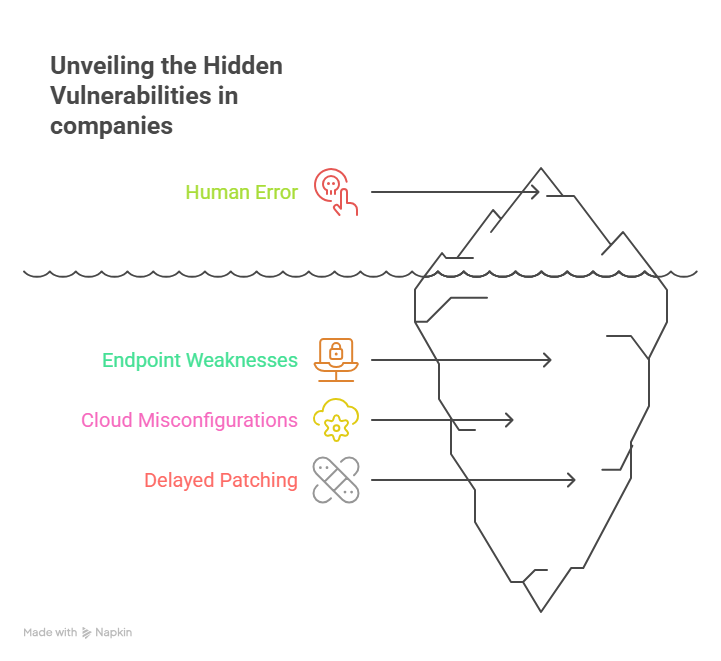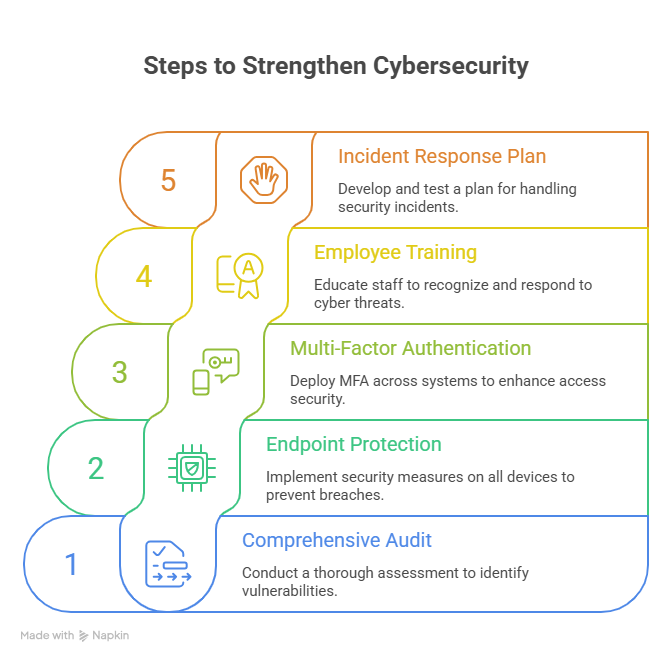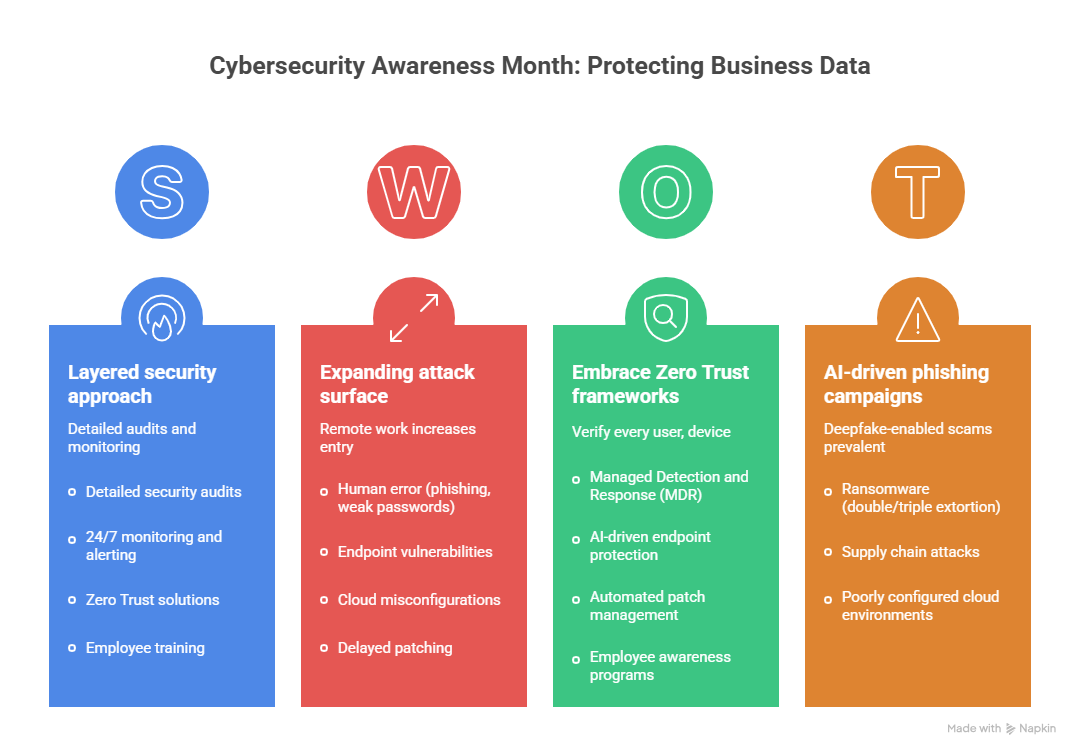Cybersecurity Awareness Month 2025: Expert Insights from Faizan Osman
October marks Cybersecurity Awareness Month and is a timely reminder that in today’s digital-first world, protecting business data and systems is no longer just an IT concern, but a boardroom priority. With the rise of remote work, cloud adoption, and AI, there is also a significant spike in cyberattacks. And organisations of every size are and have been facing the increasing risks of it.
To shed light on these challenges and provide practical guidance, we sat down with Faizan Osman, Director – ICAT Services at Catech Systems. With years of experience helping organizations strengthen their defenses, Faizan shares his perspective on where businesses are most vulnerable, what emerging threats they should prepare for, and how leaders can take proactive steps to safeguard their crucial data.
What are the biggest cybersecurity challenges organizations face today?
Faizan Osman: The biggest challenge is the rapidly expanding attack surface. With remote work, cloud services, mobile devices, and IoT, businesses have more entry points than ever.
At the same time, cybercriminals are using automation and AI to launch faster, more convincing attacks, which makes it harder for organizations to keep pace.
Where are most companies’ weakest links?
Faizan Osman: One of the most common weak links is actually the employees. Human error like clicking on a phishing link, approving a fake MFA prompt, or reusing weak passwords, remains the easiest way for attackers to get inside. Beyond that, we often find weaknesses in endpoints such as laptops and mobile devices, cloud environments with misconfigurations, and delayed patching of known vulnerabilities.
What happens if organizations don’t act on these vulnerabilities?
Faizan Osman: If vulnerabilities aren’t addressed, companies are exposed to ransomware, data breaches, financial fraud, and compliance penalties. Beyond the initial incident, attackers often come back repeatedly once they know a business is slow to respond, leading to ongoing risks.

Can a small gap really cause a big issue?
Faizan Osman: Yes. A classic example is when multi-factor authentication (MFA) isn’t enforced on every account. We’ve seen attackers compromise a single unprotected admin account and gain access to an entire network. That one missed control led to ransomware deployment and weeks of costly downtime. Today,
hackers are even using AI-engineered tools to manipulate Microsoft MFA prompts and trick employees into approving fraudulent login requests, making employee awareness and layered defenses more important than ever.
What long-term damage can a breach cause?
Faizan Osman: The damage can be devastating. Financially, ransom payments, regulatory fines, and legal costs add up quickly. Operationally, businesses face downtime, lost productivity, and delayed projects. And reputationally, customer trust can be destroyed—sometimes permanently. In extreme cases, smaller businesses never fully recover.
What are the first steps to strengthen cybersecurity?
Faizan Osman: The first step is a comprehensive audit to see where gaps exist. From there, we recommend enforcing endpoint protection and monitoring, deploying multi-factor authentication everywhere, and most importantly, investing in regular employee training so staff can spot phishing attempts and MFA manipulation. Finally, creating and testing a clear incident response plan ensures teams know exactly how to act when an attack occurs.

What emerging threats should businesses prepare for?
Faizan Osman: Organizations need to be ready for AI-driven phishing campaigns, including deepfake-enabled scams, and ransomware that uses double or triple extortion. Supply chain attacks are also rising, where attackers exploit vendors or software updates to gain entry. Finally, poorly configured cloud environments are becoming prime targets.
What strategies or technologies should companies adopt now?
Faizan Osman: Forward-thinking companies are embracing Zero Trust frameworks to verify every user and device. They are also turning to Managed Detection and Response (MDR) for 24/7 monitoring. Tools from trusted partners like NinjaOne and Huntress deliver AI-driven endpoint protection, while automated patch management helps close vulnerabilities faster. Above all, organizations should prioritize ongoing employee awareness programs as part of their defense strategy.
How does CaTECH help clients reduce risks?
Faizan Osman: At CaTECH, we take a layered security approach. That means starting with detailed security audits, providing 24/7 monitoring and alerting, and implementing Zero Trust solutions to reduce insider and external threats. We also emphasize employee training and awareness, equipping staff to recognize phishing attempts and MFA manipulation tactics.
On top of that, we ensure incident response readiness, so clients can recover quickly. By partnering with Ninja One, Huntress, and other leaders, we deliver enterprise-grade security at a scale that fits each business.
What’s one piece of advice for business leaders this Cybersecurity Awareness Month?
Faizan Osman: Cybersecurity is not just an IT issue, it's a business risk. Leaders should treat it as part of their overall strategy. The cost of prevention is always far less than the cost of recovery. By making cybersecurity a boardroom priority and investing in both technology and employee awareness, businesses can protect their future and build resilience against modern threats.

Conclusion
Cybersecurity is no longer optional, it’s a core business function. From ransomware and phishing to AI-powered cyberattacks, the risks are constantly evolving, but so are the defenses.
As Faizan Osman emphasizes, a layered approach that combines technology, training, and proactive planning is the best way to build resilience.
At Catech Systems, we partner with organizations to strengthen their cybersecurity posture with audits, 24/7 monitoring, Zero Trust frameworks, and employee training.
This 2025 Cybersecurity Awareness Month, take the first step toward securing your business.
Contact our team to learn how we can help protect your organization from today’s most pressing threats.



